News
Malahat Monostiches
"Singer"
And the single string of the trumpets marine
--Guillaume Apollinaire
translated by William Meredith
To celebrate the launch of our Twitter feed (@malahatreview), we held a Twitter Monostich Contest.
The contest began on Monday, June 18, 2012, and closed on Monday, September 10, 2012.
We collected and judged the monostiches, then awarded a prize of a free subscription to Plenitude Magazine and four new books (donated by Canadian publishers) every two weeks until September 10th (prizes were awarded July 2, July 16, July 30, August 13, August 27, and September 10).
Congratulations to our winners!
July 2nd: Melinda Cochrane
July 16th: Chantelle Rideout
July 30th: Rebecca Geleyn [GRAND PRIZE WINNER]
August 13th: Rhonda Ganz
August 27th: Lance Strate
September 10: Cathy Bryant
On October 1, a grand prize will be awarded to the best monostich, chosen from the six bi-weekly winners. Congratulations to Rebecca Geleyn, our Grand Prize Winner!
The grand prize winner, Rebecca Geleyn, will receive a copy of Sandra Djwa's biography of Malahat contributor, P. K. Page, Journey with no Maps: A Life of P. K. Page (McGill-Queen's), due out in October; Anne Szumigalski's A Woman Clothed in Words (Coteau), and Peter Sanger's John Stokes' Horse (Gaspereau); as well as a complimentary one-year subscription to The Malahat Review.
All winning monostiches were tweeted, posted on our Facebook fanpage, and on this web page.
For tips on how to write a good monostich, see:
Language is a Virus
The Writers Block
Simply Haiku
A monostich is a single-line poem. Therefore, any entered monostich that indicates linebreaks with slashes will be disqualified. If you have a title for your monostich, put it in ALL CAPs.
The Malahat Review thanks the participating publishers for their generosity and continued support.
GRAND PRIZE:
[Won by Rebecca Geleyn]
From McGill-Queen's University Press:
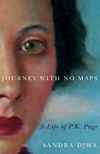
Journey with no Maps: A Life of P. K. Page, by Sandra Djwa.
Journey with No Maps is the first biography of P. K. Page, a brilliant twentieth-century poet and a fine artist. The product of over a decade's research and writing, the book follows Page as she becomes one of Canada's best-loved and most influential writers. "A borderline being," as she called herself, she recognized the new choices offered to women by modern life but followed only those related to her quest for self-discovery.
Journey with No Maps reads like a novel, drawing on the poet's voice from interviews, diaries, letters, and writings as well as the voices of her contemporaries. With the vividness of a work of fiction and the thoroughness of scholarly dedication, Djwa illustrates the complexities of Page's private experience while also documenting her public emergence as an internationally known poet. It is both the captivating story of a remarkable woman and a major contribution to the study of Canada's literary and artistic history.
From Gaspereau Press:
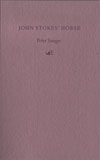
John Stokes' Horse, by Peter Sanger.
Building on the themes of his 2006 collection Aiken Drum, Sanger’s new volume of poems takes its title from the subject of an engraving by Newfoundland printmaker David Blackwood–a simple wooden horse carved by a Cape Freel man in 1907 as a gift for his grandson. In the figure of John Stokes’ horse, Sanger locates an imaginative gesture requiring the suspension of disbelief, for child and adult alike–a winged mount into a world where myth and memory mix. Looking at language, memory and art through the lens of language presents the very sort of riddle on which Sanger’s poetics thrive. As well as the title sequence, the book features a section composed of object poems(“Fishing for Jade”) generally expressing a preoccupation with light–shadows and reflections, signals, moon, water–and a more topical section (“Civics”) which assails the present state of public discourse in a tone and cadence reminiscent of T.S. Eliot’s great modernist poem, The Waste Land. The book also includes a short essay (“Leaping Time”) which combines memories, childhood booksand equine lore to provide a sort of mirror to John Stokes’ horse. These poems evoke, in Sanger’s words, “imagination’s creative energy, immanent in time and yet timeless, evidence of love, devotion and patience, evidence that by seeing art through its eyes we see more clearly through our own.”
From Coteau Books:
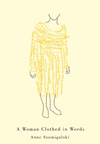
A Woman Clothed in Words, by Anne Szumigalski.
Anne Szumigalski, renowned for her breakout poetry collection Woman Reading in Bath, and her Governor General's Award winning collection Voice, was one of Canada’s most prominent poets. With her published works, as well as with her teaching and magnanimous guidance, she did much to put prairie Canadian poetry on the map.
But Anne was more than a poet. She also wrote fiction, drama, literary non-fiction, and even a Prairie liturgy. This book is a treasure trove of the best of the many literary faces of Anne Szumigalski.
THE BI-WEEKLY PRIZES:
Subscription to Plenitude Magazine.
Plenitude Magazine, Issue 1 features writing from some of Canada's most esteemed writers such as the legendary Betsy Warland, Alex Leslie, and 2012 Journey Prize nominees Trevor Corkum and Nancy Jo Cullen.
Plenitude aims to complicate expressions of queerness through the publication of diverse, sophisticated literary writing, art and film, from the very subtle to the brash and unrelenting. This is just what readers can find in Issue 1 -- from a tender story of fatherhood to a humorous look at the world of gay art porn; from Brazilian waxes to poignant love poems to genre-bending prose-poetry.
Plenitude is an electronic magazine, and is available as an EPUB (e-reader) or a PDF designed for enjoyable, eye-friendly reading even at a computer.
From Brick Books:
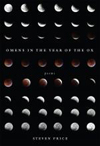
Omens in the Year of the Ox, by Steven Price.
[Won by Rhonda Ganz, August 13]
Steven Price’s second collection is part of a long-lived struggle to address the mysteries that both surround and inhabit us. The book draws together moments both contemporary and historical, ranging from Herodotus to Augustine of Hippo, from a North American childhood to Greek mythology; indeed, the collection is threaded with interjections from a Greek-style chorus of clever-minded, mischievous beings—half-ghost, half-muse—whose commentaries tormentingly egg the writer on. In poems that range from free verse to prose to formal constructions, Price addresses the moral lack in the human heart and the labour of living with such a heart. Yet the Hopkins-like, sonorous beauty of the language reveals “grace and the idea of grace everywhere, in spite of what we do.” The pleasures of Price’s musicality permeate confrontation with even the darkest of human moments; the poems thus surreptitiously remind us that to confront our own darkness is one of the divine acts of which humans are capable.
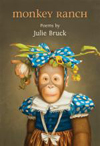
Monkey Ranch, by Julie Bruck.
[Won by Cathy Bryant, September 10]
… a mandrill, a middle-aged woman, a shattered Baghdad neighbourhood, a long marriage, even a spoon, grapple with this unanswerable conundrum—sometimes with rage, or plain persistence, sometimes with the furious joy of a dog who gets to ride with his head through a truck’s passenger window. Julie Bruck’s third book of poetry is a brilliant and unusual blend of pathos and play, of deep seriousness and wildly veering humour. Though Bruck “does not stammer when it's time to speak up,” and “will not blink when it's time to stare directly at the uncomfortable,” as Cornelius Eady says in his blurb for the book, “in Monkey Ranch she celebrates more than she sighs, and she smartly avoids the shallow trap of mere indignation by infusing her lines with bright, nimble turns, the small, yet indelible detail. Bruck sees everything we do; she just seems to see it wiser. Her poems sing and roil with everything complicated and joyous we human monkeys are.”
From Brindle & Glass:
In The Flesh: Twenty Writers Explore the Body, Edited by Lynne Van Luven and Kathy Page.
[Won by Rebecca Geleyn, July 30]
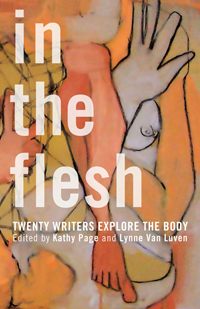
In the Flesh is an intelligent, witty, and provocative look at how we think about—and live within—our bodies. The editors and writers in this collection describe, in many voices, what human bodies feel now. Each author’s candid essay focuses on one part of the body, and explores its function, its meanings, and the role it has played in his or her life.
Written from both the male and female perspectives, contributors include Caroline Adderson, André Alexis, Taiaiake Alfred, Brian Brett, Trevor Cole, Dede Crane, Lorna Crozier, Candace Fertile, Stephen Gauer, Julian Gunn, Heather Kuttai, Susan Olding, Kate Pullinger, Merilyn Simonds, Richard Steel, Madeleine Thien, Sue Thomas, and Margaret Thompson.
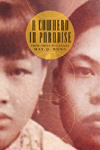
A Cowherd in Paradise: From China to Canada, by May Q. Wong.
[Won by Chantelle Rideout, July 16 ]
In 2006, the Prime Minister apologized to the Chinese people for the legislated discrimination created by Canada’s head tax laws in the first half of the twentieth century, acknowledging the far-reaching and long-term consequences it has had on their families. A Cowherd in Paradise is the story of one such family.
The book chronicles the remarkable lives of Wong Guey Dang (1902–1983) and Jiang Tew Thloo (1911–2002). Ah Dang was born into an impoverished family and sold as a child. In 1921, his adoptive father paid a five-hundred-dollar head tax to send Ah Dang to Canada. Eight years later, driven to create a family of his own, Ah Dang returned to China, where he chose Ah Thloo as his bride from a matchmaker’s photo.
From Coteau Books:
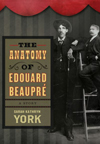
The Anatomy of Edouard Beaupre: A Story, by Sarah Kathryn York.
[Won by Melinda Cochrane, July 2]
A Montreal doctor investigates the cadaver of the famous Willow Bunch Giant, trying to solve the mystery of why the preserved body is shrinking. His own physical limitations add an urgency to his research, as his body too is failing; a rare condition means it is gradually absorbing its own bones.
By the book’s close, the physical mystery is solved, a paper published, acclaim afforded, but the narrator understands he is perhaps farther than ever from understanding Edouard Beaupre’s true anatomy.
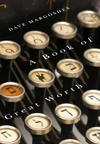
A Book of Great Worth, by Dave Margoshes.
[Won by Lance Strate, August 27 ]
Set largely among the Jewish community of inter-war New York City, this is a beautifully-told collection of scenes from Morgenstern’s life. The tricky ground of writing the advice column for a provincial Yiddish daily; successes during, and hard times after, the Depression; a position at the top of his craft as a labour specialist in the New York City Yiddish press – these and many more form a portrait of “a fundamentally decent man in morally perplexing situations”.
“All the stories in the series walk that precarious tightrope between memoir and fiction…“I worked hard, with the stories’ structure and a sort of old-fashioned expository style, to make them feel like memoir – like truth.”
From Goose Lane Editions:
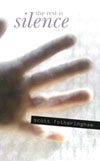
The Rest is Silence, by Scott Fotheringham.
[Won by Chantelle Rideout, July 16]
“Some things won’t be lost.”
In the backwoods of Nova Scotia, a man slowly withdraws himself from the world. He fills his days with planting a garden. Building a cabin. Carving out friendships. Falling in love. His nights are for storytelling. A saga of youthful passions, of idealism and hope, of science and rebellion. Outside the forest, news reports trickle in. A worldwide catastrophe is brewing. People are frightened. Governments are in turmoil. The future is uncertain. And as the story unfolds, we learn the consequences of believing we were ever ready to open Pandora’s Box. Bold of theme, sensual of language, and astonishing in its implications, The Rest is Silence is a stunning achievement.
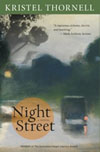
Night Street, by Kristel Thornell.
[Won by Rhonda Ganz, August 13]
In 1914, Clarice Beckett sought the unusual, resisting social conventions by pursuing a career in painting, defying her family by yearning for a life of passion and sensuality. Her atmospheric, enigmatic landscapes garnered little approval from critics, who disparaged her style and subjects. Despite this censure, Clarice refused to compromise, unconventionally exploring her sexuality while relentlessly pursuing her talent. Unearthing the remarkable in the mundane, she transmuted simple cityscapes and seaside terrains into revelatory works of art.
This extraordinary story found its roots when Kristel Thornell first encountered the paintings of the now-famous Clarice Beckett at the Art Gallery of South Australia. The subtle power of Beckett’s landscapes prompted her to imagine Clarice’s inner life, shaping the artist’s history into a hauntingly erotic novel.
From Mother Tongue Publishing:
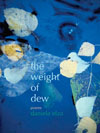
the weight of dew, by daniela elza.
[Won by Melinda Cochrane, July 2]In the weght of dew, Daniela Elza's remarkably elegant debut book of poetry, we are taken on a journey from the city, inland, though (mostly) British Columbia. These poems are delicate, condensed, crystallized, yet paradoxially spacious, not only visually but philosophically. In the miles and mediations Elza travels light. Gently asks quesions about our existence - transforming us through the alphabet of her knowing.
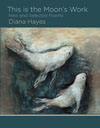
This is the Moon's Work. New and Selected Poems, by Diana Hayes.
[Won by Rebecca Geleyn, July 30]
This is the Moon's Work showcases Diana Hayes' new work and a selection of poetry from early out-of-pring books. Diana's themes are rooted in both the inner and outer worlds of nature and the psyche. Many of her new poems have been inspired by her practice of year-round ocean swimming. The poems explore the world of Bardo where healing into a new life becomes possible.
From Nightwood Editions:
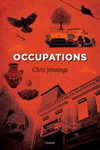
Occupations, by Chris Jennings.
[Won by Lance Strate, August 27 ]
The poems in Chris Jennings’ long-awaited debut poetry collection are linked at their core by a preoccupation with the ways objects or moments become charged with meaning. Narrative occupies the territory of memory, making the most ordinary things—a classified ad, the odds and ends of an estate auction, graffiti, an antique lancet, a vegetable stand—touchstones and reliquaries of other lives. Sometimes reserved, sometimes exploring what a poet can do with excess, Jennings moves fluidly between objective detachment, quiet intimacy and the tone of a cynic in a sentimental mood.
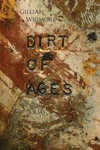
Dirt of Ages, by Gillian Wigmore.
[Won by Rhonda Ganz, August 13]
Dirt of Ages is the highly anticipated second book of poetry by Gillian Wigmore, whose debut collection soft geography (2007) captured the ReLit Prize for Poetry and was shortlisted for the Dorothy Livesay BC Book Prize.
In Dirt of Ages, everything meets in “the perfect v” of the valley: where rivers meet in an “exchange between sky and water,” where rural runs into urban,“where art and work meet,”“the rush and rattle,” where fog and smog converge as “foetid fall inversions,” and where “two chafe so close together.”
From Pedlar Press:
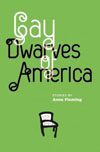
Gay Dwarves of America, by Anne Fleming.
[Won by Melinda Cochrane, July 2]Anne Fleming is the author of Pool-Hopping and Other Stories, which was shortlisted for the Governor General's Award for Fiction, the Ethel Wilson Fiction Prize, and the Danuta Gleed Award, as well as the critically acclaimed novel, Anomaly. She divides her time between Vancouver and Kelowna, where she teaches creative writing at UBC's Okanagan campus.

Giant, by Aga Maksimowska.
[Won by Rebecca Geleyn, July 30]
How do you fit in in a new country when you’re a “giant freak,” you don’t speak the language and bizarre things are happening to your motherland as well as to your body? In a candid and peculiar voice reminiscent of Heather O’Neill’s Lullabies for Little Criminals, Aga Maksimowska tells the story of an eleven-year-old girl in an adult’s body whose coming of age in a country undergoing a revolution is interrupted by a sudden and cruel move to Canada.
From Ronsdale Press:

Cathedral, by Pamela Porter.
[Won by Rebecca Geleyn, July 30]
This collection of poems takes us on a journey — a very personal journey of Pamela Porter’s own — to Africa and South America, those corners of the world the news reports never seem to cover: to Angola’s thirty-year-long civil war, a landscape overrun with poverty, AIDS, and infant mortality; and to the struggles of ordinary people still haunted by the past horrors of Argentina’s “dirty war.”
With language deceptively simple, filled with music, colour and rich detail, Porter writes with grace and compassion, making a fierce beauty from all she sees, celebrating the resilience of the poor and oppressed, who nonetheless remain determined to live their lives with dignity and with joy.
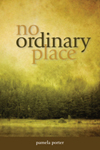
no ordinary place, by Pamela Porter.
[Won by Rhonda Ganz, August 13]
Pamela Porter’s poems celebrate a world awaiting discovery. She opens this new collection with a poem entitled “An Offering” in which she brings to the ceremony “poems / for every season — of dreams born, / burning, broken” and, in particular, one that “begins like a perilous grace” to develop as “naked and tender and wanting.” Throughout, one hears and sees images that connect both the poet and reader to other dimensions. Always for Porter, there is the moment tentatively coming into being where the mundane is transformed into something totally unexpected and otherworldly. The image can be one that develops from the natural world as in “Branches, Early Spring,” where she sees how “the trees’ red sap set the sky on fire.” Another poem based in nature is “Naming” in which “small birds life into the sky / holding in their beaks / the words we don’t need to say.” Throughout, Porter’s poems celebrate moments when we experience “the beginning of the world again.”
From Thistledown Press:
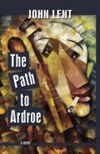
The Path to Ardroe, by John Lent.
[Won by Chantelle Rideout, July 16 ]
The Path to Ardroe is an exploration of friendship and its limits, life changes, and the challenges and aspirations of writers. Peter Chisholm, a writer wrestling with his craft, finds himself at forty-two without direction, and so it seems an eerie coincidence to him that unplanned events have conspired to place him in Lochinver, Scotland, developing his next novel, seeking out his former lover, and trying to find a solution to his restlessness and self-imposed fakery. But he has no idea of the fearful ghosts he will conjure. In various states of introspection Peter’s friends are also coming to terms with their own life-changing moments. For emerging writer Melissa Picard, on a six-month trip to Strasbourg, France, it will be her struggle with the past criticisms of her writing. Through a budding friendship with a celebrated writer and a transformative affair with an artist, she begins to understand that her challenges are not unique and that to write with a simple purity, the way Derain painted, she must finally listen to her own voice.
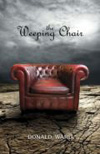
The Weeping Chair, by Donald Ward.
[Won by Cathy Bryant, September 10]
Donald Ward’s stories in The Weeping Chair are confidently layered with unexpected situations and characters whose faith in themselves provides the strength to confront whatever weird or challenging experience befalls them. While Ward’s style is steeped in the traditional storytelling structures of Flannery O’Connor and P.G. Wodehouse, his highly imaginative settings and eccentric character profiles push the stories’ energies into contemporary spheres of literary entertainment. His thematic pursuits usually deal with the human willingness to carry on in the face of an often hostile and baffling universe, where nothing is as it first appears and that is clearly evident in this collection.
From Tightrope Books:
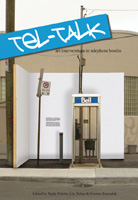
Tel-Talk: art interventions in telephone booths , Edited by Paola Poletto, Liis Toliao, & Yvonne Koscielak.
[Won by Cathy Bryant, September 10]
The Tel-talk project brings together artists of varying backgrounds, from across the country, to perform in and or animate a telephone booth in response to themes surrounding public spaces, and the disappearance of traditional phone booths. Artists and writers were invited to contribute a site-specific installation, artwork, or short work of fiction, which references a unique telephone booth location. The installations began in September 2011 and continued through to July 2012. Each installation was announced and documented on the Tel-talk blog.
From Touchwood Editions:
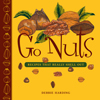
Go Nuts: Recipes That Really Shell Out, by Debbie Harding.
[Won by Cathy Bryant, September 10]
This exciting culinary collection has something for everyone, from the seasoned cook to the budding new chef. The recipes are of easy-to-medium difficulty with a few advanced choices, and encompass exotic, savory, sweet, affordable, healthy, organic, vegetarian and meat-lovers specialties. Well-tested, these dishes will get you rave reviews from family and friends. Along with helpful nutritional information and instructions on how to handle, store and toast different types of nuts, a pairing guide is also included so you will learn what food and beverages go well with each type of nut. Sample recipes include Pumpkin Pecan Pancakes, Honey Almond Spread, Sherried Mushroom and Chestnut Soup, Brie and Walnut Stuffed Figs, Chocolate Almond Fudge Cake and many more.
From University of Alberta Press:
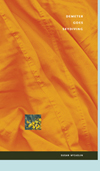
Demeter Goes Skydiving, by Susan McCaslin.
[Won by Lance Strate, August 27 ]
What if Demeter, the timeless fertility goddess of ancient Greek myth, slipped through a crack into the twenty-first century, shook off her ankle bracelets, corn tassels, and garlands, and began a tour of our improbable culture? Award-winning poet Susan McCaslin exercises the profound mother-daughter trauma forged in the Demeter-Persephone myth with unapologetic modernity. This sequence takes on a novel life all its own: Hades steals away the maiden into a cult/culture of distorted body image, addiction, high anxiety, and rampant consumerism. Mother Demeter must negotiate this alien world of health clubs, paparazzi, and so-called reality shows locked in spiritual winter. McCaslin's lyrics are by turns profound, hilarious, and devastating as she journeys to the heart of a mother's love for her daughter. Here is poetry that seeks ties to the past inside the present, poetry that speaks to us all.
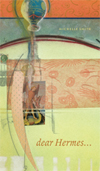
dear Hermes ..., by Michelle Smith.
[Won by Chantelle Rideout, July 16 ]
By turns joyous and adventurous, melancholy and nostalgic, Michelle Smith's debut collection of poems showcases a wide-ranging fascination with places, people, and story. Smith's limpid and humane handling of an array of themes, emotions, and styles—her Norwegian ancestry, her Canadian Prairie heritage, the significance of family, the fragility of memory, world travel, ekphrasis, myth, and more—exemplifies the lyric self on a poetic grand tour, or pilgrimage, to meet the world. Framed by imaginative travelogues addressed to Greek gods, dear Hermes... offers readers an escape and an entrance—out of time and into the poet's luminous experience. Readers who appreciate clear lyric and fleet voicing will relish Smith's poetry.
From Wolsak and Wynn:

Catalysts: Confrontations with the muse, by Catherine Owen.
[Won by Lance Strate, August 27 ]
With her characteristic fearlessness Catherine Owen examines what drives her to write and the influences that shape her writing. From her childhood memories in suburban Vancouver to her willingness to risk all for a glimpse of her muse, the essays in Catalysts allow readers unparalleled insight into Owen’s creative life. A brilliantly honest collection, these essays should be read by every aspiring author.

We, Beasts, by Oana Avasilichioaei.
[Won by Melinda Cochrane, July 2]With undeniable verve, Oana Avasilichioaei upends expectations of literature and poetry in this fascinating collection. We, Beasts is a fairy tale; a book within a book; a collection of verse; a mediation on language, real and imagined and a sly social commentary all in one.









